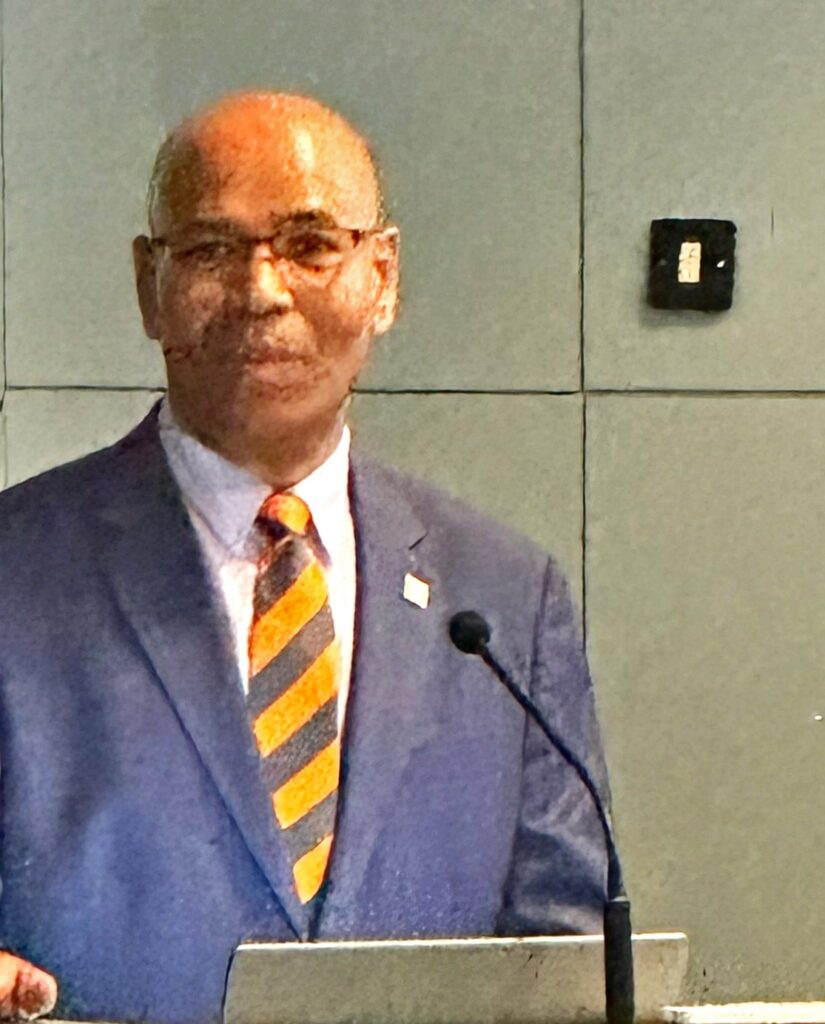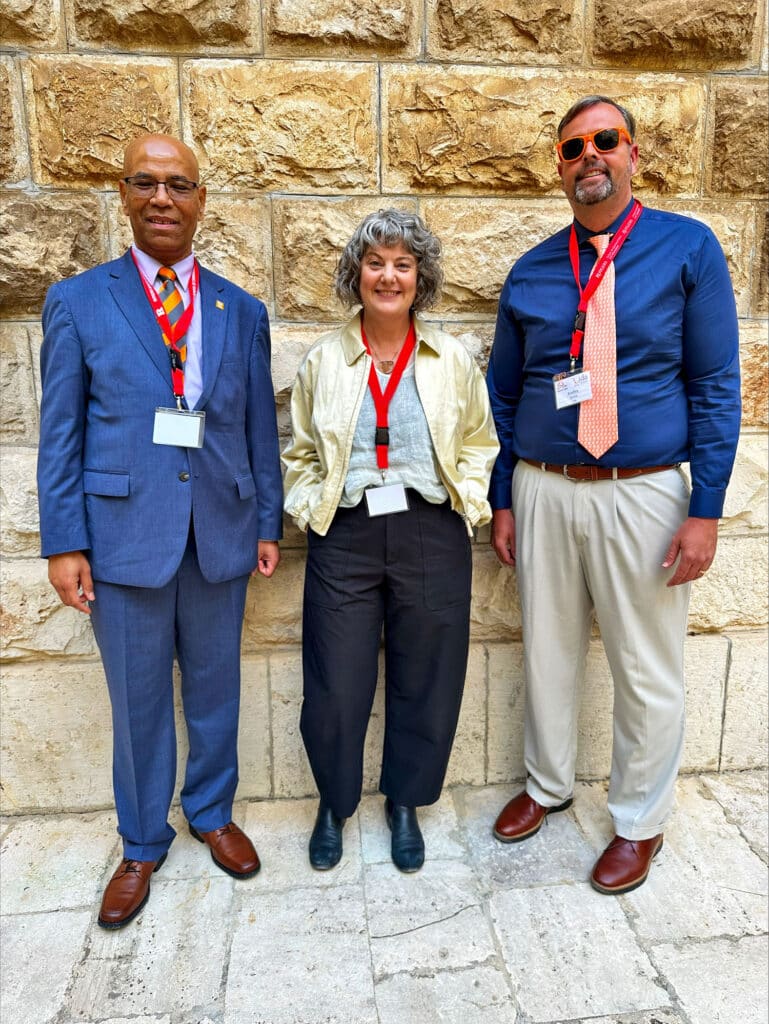The Libraries in the Digital Age (LIDA) conference is an internationally recognized event that celebrated its 25th anniversary this year in Dubrovnik, Croatia. Several faculty members, students, and alumni from the School of Information Sciences (SIS) attended and participated in engaging workshops and presentations at this year’s LIDA conference, which is one of many events in the fields of information science and library studies in which SIS participates globally.
“LIDA featured a wide variety of speakers and topics related to all aspects of information sciences,” said Professor Wade Bishop. “It’s always enjoyable to showcase SIS on the global stage.”
Director Abebe Rorissa’s Keynote Address
SIS Director Abebe Rorissa served as the keynote speaker at the conference, delivering a speech titled The Content Divide: Contributing Factors and How Libraries and Other Stakeholders Can Address It.
“When the conference organizers invited me to give a keynote talk at LIDA, I couldn’t refuse because of the conference’s prestige and the prominent scholars associated with it. My talk was introduced by an in memoriam session for one of the leading figures in our field, Dr. Tefko Saracevic, the creator of LIDA, who sadly passed away last year,” Rorissa shared.
In preparation for his keynote speech, Rorissa researched the conference audience to ensure his message would resonate. He tailored his talk and his humor to align with their interests and passions.

“I always include some bad jokes in my talks,” he said with a laugh.
During his keynote, Rorissa emphasized that we live in an information and knowledge society where access to data, information, and knowledge plays a crucial role in the lives of individuals and organizations across every sector. He highlighted the importance of ensuring these resources are both available and equitable.
“The right and freedom to create, disseminate, use, and benefit from information is a fundamental right protected by international human rights declarations,” he explained.
However, he pointed out this right is not equally realized by all.
“The information and content divide is a barrier that prevents a significant portion of society from fully benefiting from those rights,” he stated.
He concluded by calling for a collective responsibility across sectors to address this challenge.
“Libraries and information professionals, along with government and the private sector, have a critical role to play in bridging the resolution to the information/content and digital divides,” he said.
Rorissa added, “I believe that bridging the information/content and digital divides aligns well with the land-grant mission of the College of Communication and Information and the University of Tennessee. The communities we serve, both within the state and beyond, should have the right to benefit from information and science.”
Rorissa’s keynote was well received, generating many questions at the end, though he couldn’t address them all due to time constraints. He managed to speak to some attendees offstage as the conference continued, making valuable connections.
“I discovered that a few audience members shared an interest in a similar topic, and I connected with some of them for potential collaboration. One attendee is even considering inviting me to give a similar talk in her country or at her institution,” he shared.
Faculty and Alumni Connect
This was Bishop’s first LIDA conference, and he felt it was important to attend to hear Rorissa deliver the keynote address in honor of the conference’s 25th anniversary and to pay tribute to Tefko Saracevic, a founder of the field of information sciences and the conference itself.
“Rorissa’s keynote was captivating. He used his sense of humor to address some challenging topics related to the content divide in our field,” Bishop said.
Bishop participated in two major sessions at the conference: a panel titled “Navigating Mental Health and Wellness for Communities within Librarianship and the Academy,” which featured his partner, Dr. Jenn Bishop, a clinical psychologist, and a presentation of a co-authored paper with SIS Associate Professor Rachel Fleming-May titled A Research Data Future for Humanities Liaisons.
“The trip was particularly special as my panel on mental health included the other Dr. Bishop, my partner and clinical psychologist. This was a unique opportunity for us to collaborate academically on a topic that is very important in libraries and academia,” he remarked.

Bishop enjoys attending international conferences because they allow him to learn from scholars around the globe, offering new insights into different practices and strengthening his understanding of how things operate in US institutions.
Rorissa and Bishop also had the chance to meet several alumni and hear them present their research.
“I attended Kristina Larsen’s workshop on creating web-based mapping applications from historic maps. It was extremely rewarding because she was my advisee, and I saw her develop skills in our program. Now she is doing so much more and advancing the field,” Bishop stated.
SIS alumna Larsen (‘23) now works at Stanford University as the assistant curator at the David Rumsey Map Center.
Bishop also caught up with alumni Hannah Fountain (‘23), who now works at Pratt Institute Libraries, and Roger Justus (‘24), who is a data services librarian at Miami University. Both presented papers at the conference.
Global Engagement and Cultural Experiences
LIDA featured a variety of speakers and topics related to all aspects of information sciences, providing an opportunity to showcase the School of Information Sciences (SIS) on a global stage.
“I engaged in meaningful discussions and conversations with scholars and practitioners from diverse parts of the world, whom we usually don’t interact with. We should continue to find ways to connect with individuals and institutions whose interests and missions align with ours,” Rorissa stated.
During the conference, Rorissa met several colleagues from North America, Europe, Asia, Africa, and other regions.
Dubrovnik emerged as the perfect location for the conference, given that neither Rorissa nor Bishop had visited before. They learned about the city’s rich history as a port that facilitated trade across empires. In 1991, Dubrovnik experienced the Siege of Dubrovnik, a military engagement between the Yugoslav People’s Army (JNA) and Croatian forces. The city has since recovered and is now known as the “pearl of the Adriatic.” It also features prominently in a well-known streaming television series.
“The conference was excellent, but the venue and the host city were truly magnificent! I got to tell my family and friends that I’ve been to ‘King’s Landing’ from Game of Thrones,” Rorissa shared.
Both Rorissa and Bishop highly recommend this conference to others and hope to return in the coming years.
“It provides our faculty and students with a chance to share their work and ideas, engage with different groups of scholars, educators, and professionals, and expand their networks,” Rorissa added.

